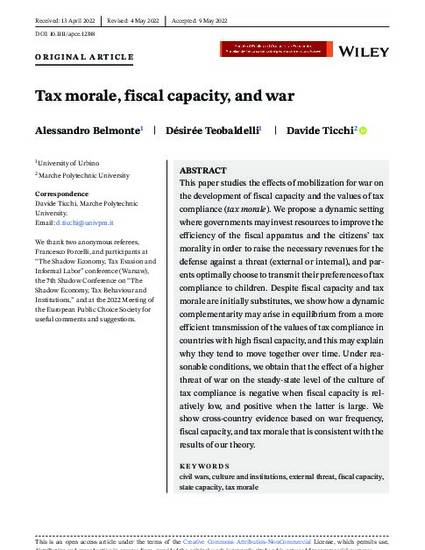
Article
Tax Morale, Fiscal Capacity, and War
Annals of Public and Cooperative Economics
(2023)
Abstract
This paper studies the effects of mobilization for war on the development of fiscal capacity and the values of tax compliance (tax morale). We propose a dynamic setting where governments may invest resources to improve the efficiency of the fiscal apparatus and the citizens' tax morality in order to raise the necessary revenues for the defense against a threat (external or internal), and parents optimally choose to transmit their preferences of tax compliance to children. Despite fiscal capacity and tax morale are initially substitutes, we show how a dynamic complementarity may arise in equilibrium from a more efficient transmission of the values of tax compliance in countries with high fiscal capacity, and this may explain why they tend to move together over time. Under reasonable conditions, we obtain that the effect of a higher threat of war on the steady-state level of the culture of tax compliance is negative when fiscal capacity is relatively low, and positive when the latter is large. We show cross-country evidence based on war frequency, fiscal capacity, and tax morale that is consistent with the results of our theory.
Keywords
- civil wars,
- culture and institutions,
- external threat,
- fiscal capacity,
- state capacity,
- tax morale
Disciplines
Publication Date
Summer June 1, 2023
DOI
10.1111/apce.12388
Citation Information
Belmonte, Alessandro, Désirée Teobaldelli, Davide Ticchi. “Tax Morale, Fiscal Capacity, and War.” Annals of Public and Cooperative Economics, 2023, 94(2), 445–474. https://doi.org/10.1111/apce.12388
